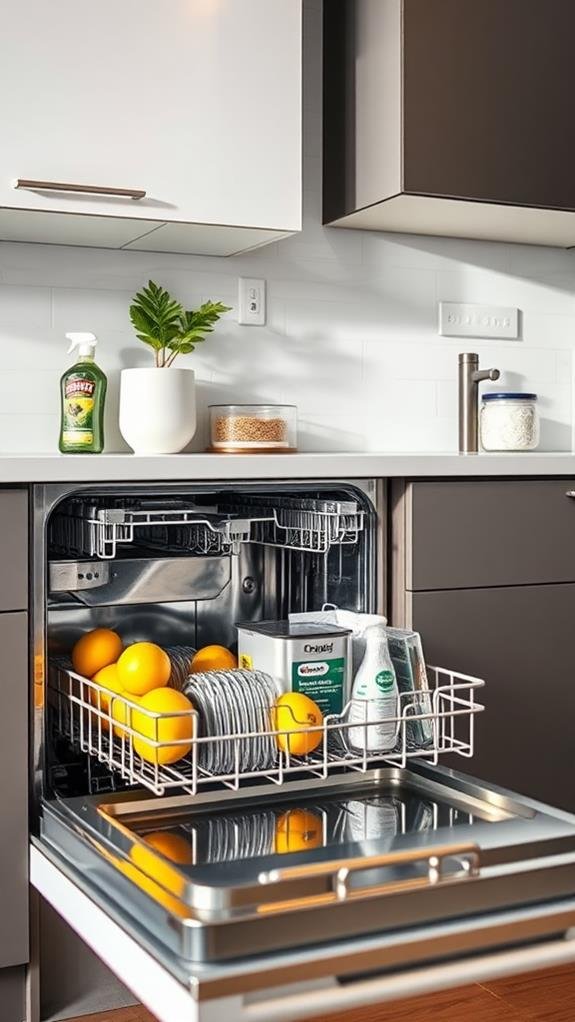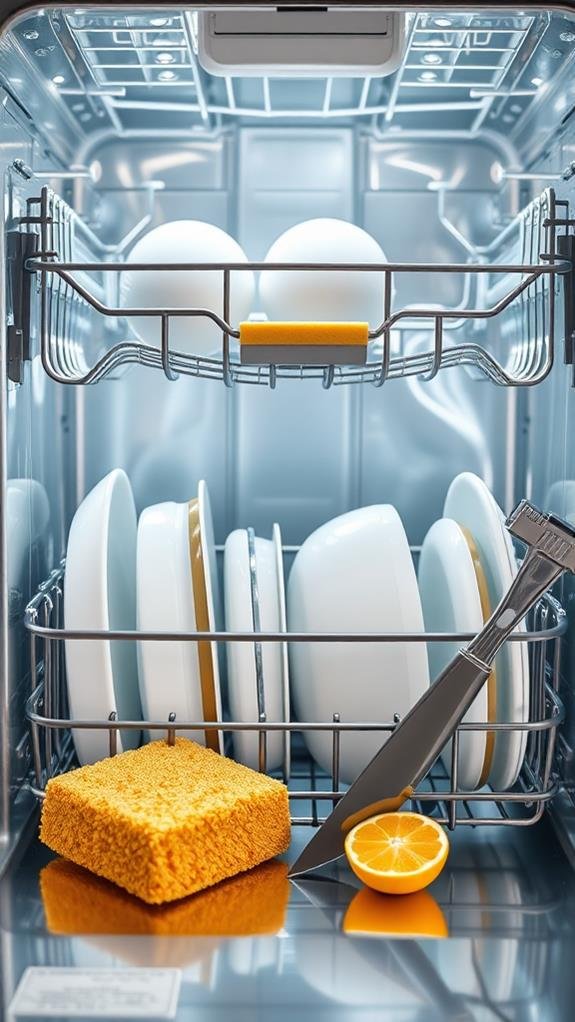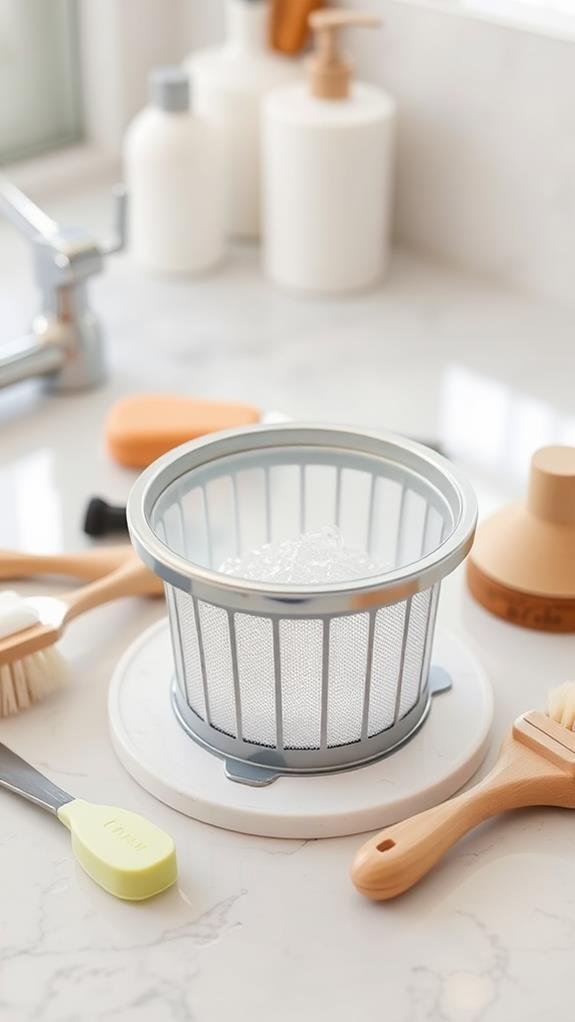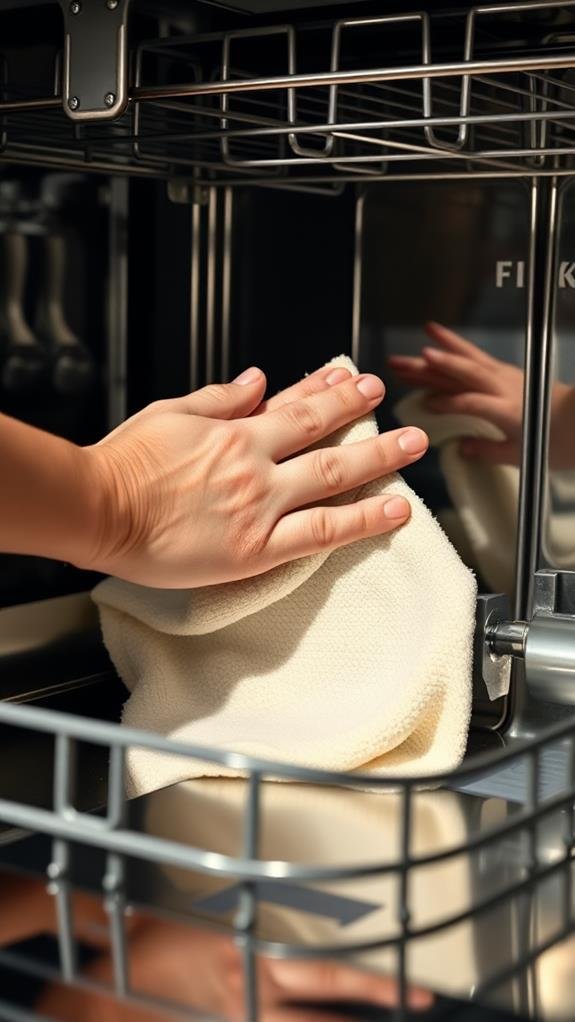Ultimate Dishwasher Cleaning Guide With Tips and Tricks
Cleaning your dishwasher is essential for its performance and longevity. To get started, empty it completely and wipe down the exterior. Use a bowl of white vinegar on the top rack and run a hot cycle to eliminate odors, then follow up with baking soda on the bottom for extra freshness. Don’t forget to clean the filter and spray arms, as these can get clogged over time. Finally, check seals and gaskets for buildup. Regular maintenance every month keeps everything running smoothly and helps your dishwasher last longer. There’s plenty more to investigate on how to keep it in top shape!
Key Takeaways
- Regularly clean the filter and spray arms to prevent clogs and ensure efficient water flow during cycles.
- Use white vinegar and baking soda to effectively tackle odors and stains inside the dishwasher.
- Wipe down seals and gaskets with warm, soapy water to remove dirt and prevent leaks.
- Run the dishwasher cleaner every few months to maintain peak performance and extend appliance lifespan.
- Air out the dishwasher after cycles to help prevent mold and unpleasant smells from developing.
Importance of Cleaning Your Dishwasher

Cleaning your dishwasher isn’t just a chore; it’s vital for maintaining its performance and longevity. Over time, food particles, grease, and even hard water deposits can build up, causing your dishwasher to work harder than necessary.
This can lead to clogs or malfunctions, and nobody wants to deal with that! By regularly cleaning your dishwasher, you verify it runs smoothly, helping to prevent unpleasant odors and better clean your dishes.
Additionally, a well-maintained dishwasher can save you money on energy bills because it operates efficiently. It also extends the lifespan of the appliance, so you won’t have to worry about replacing it anytime soon.
Taking a little time to clean your dishwasher can make a big difference in your kitchen.
Cleaning Supplies You Need

Before you plunge into cleaning your dishwasher, it’s essential to gather the right supplies.
You’ll need a few key items to make the job easier and more effective. Start with white vinegar, which helps remove grease and odors. Baking soda is another essential; it’ll freshen things up while tackling any stubborn stains.
A soft sponge or cloth is perfect for gentle scrubbing, and don’t forget a toothbrush for those hard-to-reach areas. You’ll also want an old towel handy to catch any drips.
Step-by-Step Cleaning Process

A sparkling dishwasher starts with a solid cleaning routine.
First, empty the dishwasher of all dishes. Next, wipe down the exterior and control panel with a damp cloth, removing any sticky spots or spills.
Then, grab a bowl of white vinegar and place it on the top rack. Run a hot water cycle to help break down grease and odors—all while leaving your dishwasher invigorating.
After that, sprinkle a cup of baking soda on the bottom and run a short cycle. This step tackles stains and gives your dishwasher a refreshing fragrance.
Don’t forget to check for any loose debris or grime at the bottom, and remove it as you go. Consistently following this process will keep your dishwasher in top shape!
Removing and Cleaning Filters

Filters play an essential role in keeping your dishwasher running efficiently, so it’s important to check and clean them regularly.
Start by unplugging your dishwasher for safety. Most filters are located at the bottom, beneath the spray arm. Gently twist or pull the filter out, taking care not to damage anything.
Rinse the filter under warm water to remove food particles and debris. For stubborn bits, use a soft brush or sponge. Avoid harsh chemicals, as they can damage the filter.
Once it’s clean, reinstall the filter securely, ensuring it fits snugly in place. Finally, plug your dishwasher back in and feel satisfied knowing you’re helping it work better!
Regular filter cleaning can extend your dishwasher’s lifespan considerably.
Dealing With Stubborn Odors

After cleaning the filters, you might notice lingering odors in your dishwasher that can be just as frustrating.
To tackle these stubborn smells, start by running a cycle with a cup of white vinegar placed in a dishwasher-safe container on the top rack. The vinegar works as a natural deodorizer, breaking down odors effectively.
If that doesn’t help, sprinkle a cup of baking soda on the bottom of the dishwasher and run a short hot cycle. Baking soda neutralizes odors and leaves your dishwasher smelling fresh.
Also, pay attention to any food remnants stuck in hard-to-reach spots. Regularly check for and remove these scraps, as they can also contribute to unpleasant smells.
With these steps, you’ll enjoy a cleaner, fresher dishwasher!
Cleaning the Spray Arms

How often do you think about cleaning the spray arms of your dishwasher? You should do it regularly, as debris and food particles can clog them, affecting their performance.
To clean them, start by removing the spray arms—usually, they just twist or pull off. Rinse them under warm water to dislodge any bits stuck inside. If you notice stubborn debris, use a soft brush, like an old toothbrush, to scrub gently.
After cleaning, make certain any holes in the spray arms are clear so water can spray evenly during cycles. Once you’re satisfied, reattach them securely.
Wiping Down Seals and Gaskets

The seals and gaskets in your dishwasher play an essential role in keeping water where it belongs—inside the machine. Over time, these areas can accumulate grime, food particles, and even mold.
To maintain their effectiveness, take a soft cloth or sponge and gently wipe down the seals and gaskets. Use warm, soapy water, and pay close attention to any crevices where dirt might hide. Rinse with a clean damp cloth to remove soap residue.
It’s vital to avoid harsh chemicals, as they can damage the seals. Regularly inspecting and cleaning these parts will help your dishwasher run smoothly, reduce leaks, and prolong its lifespan.
Just a few minutes of care can make a big difference!
Regular Maintenance Tips

To keep your dishwasher functioning at its best, regular maintenance is key. Start by cleaning the filter monthly. Simply remove it, rinse it under warm water, and scrub away any debris.
Next, check the spray arms for clogs. A toothpick can help clear any blocked holes, making sure water flows freely. Don’t forget to inspect the door seals; wipe them down with a damp cloth to prevent buildup.
Also, run a cycle with a dishwasher cleaner once every few months to eliminate grease and odor. Finally, make sure your dishwasher’s exterior is clean; a quick wipe down keeps it looking new.
Troubleshooting Common Issues

Understanding common issues can greatly improve your dishwasher experience. If your dishes aren’t coming out clean, first check the spray arms; they might be clogged with food debris.
Listen for any unusual noises, as they could indicate a loose part or a blocked impeller. If water isn’t draining properly, inspect the filter and drain for any blockages.
Also, make certain that the door seals tightly; a gap might let water escape, causing poor cleaning. If you notice a foul odor, it might be time to clean the interior and remove any leftover food particles.
Expert Tips for Longevity

Maintaining your dishwasher properly can greatly extend its lifespan and efficiency. Start by cleaning the filter regularly; food particles can clog it and lead to issues.
Also, make sure to run hot water before starting your cycle to help dissolve grease. Use the right detergent, too—check your manufacturer’s recommendations to avoid damaging your machine.
While you’re at it, inspect the door seals for any cracks or debris; a good seal prevents leaks and maintains energy efficiency.
Additionally, let your dishwasher air out after cycles to prevent mold buildup. Finally, consider running a cleaning cycle with vinegar or a dishwasher cleaner monthly.
These simple steps will keep your dishwasher running smoothly for years, allowing you to enjoy hassle-free clean dishes.
Conclusion
By keeping your dishwasher clean, you’ll not only improve its performance but also extend its lifespan. Make cleaning a regular habit and your dishwasher will thank you with sparkling dishes and less unpleasant odors. Remember to follow the steps in this guide, use the right supplies, and take care of those filters and seals. With a little effort, you’ll guarantee your appliance runs smoothly, providing you with clean dishes for years to come!

